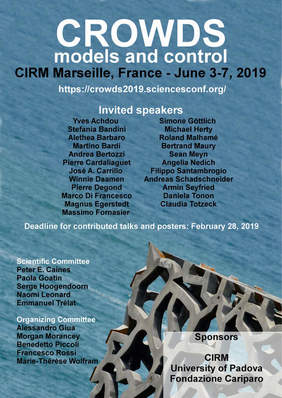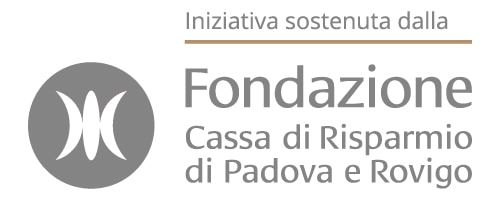Crowds: Models and Control
Foules : modèles et commande
3 – 7 June 2019
|
Scientific Committee
Comité scientifique Peter E. Caines (McGill University) Organizing Committee
Comité d’organisation Alessandro Giua (University of Cagliari) |
|
The problem of modeling crowds of a large number of interacting agents has been an extremely challenging problem for the mathematical community. This led to the development of several key mathematical theories, catching different aspects of crowds, ranging from mean-field limits for interacting particles, to hyperbolic systems for road traffic models, to dynamics on graphs and networks, to stochastic models, and to adapted numerical methods.
The conference aims to gather together different communities working on two connected problems for crowds. On one side, modeling crowds keeps being a stimulating issue, in particular for understanding the phenomenon of self-organization: how can a set of simple one-to-one interactions between agents produce macroscopic patterns, such as lines, swarms and flocks? Several mathematical communities have proposed different tools for modeling crowds, such as microscopic and macroscopic models, stochastic approaches, mean-field games or conservation laws. On the other side, the control of crowds is of paramount interest: how can an external control enforce a desired behavior to the crowd? In particular, how to drive a crowd towards an efficient macroscopic pattern, such as lines for egress problems? The control community has proposed a large spectrum of methods, such as control on graphs, numerical methods for optimization of conservation laws, control of the continuity equation. The two aspects of proper modeling and efficient control are then intimately connected. For this reason, the conference aims to strengthen connections between researchers in modeling and control of crowds. |
Le problème de la modélisation d’un grand nombre d’agents en interaction a été extrêmement significatif pour la communauté mathématique. Il a permis de développer plusieurs théories mathématiques, capables de représenter certaines caractéristiques des foules : les limites de champ moyen pour les particules en interaction, les systèmes hyperboliques pour les modèles de trafic routier, la dynamique sur graphes et réseaux, les modèles stochastiques ainsi que des méthodes numériques adaptées.
La conférence se pose comme objectif de rassembler l’ensemble des communautés, travaillant sur deux problèmes pour les foules profondément liés. D’un côté, la modélisation de foules reste un problème très stimulant, en particulier pour comprendre le phénomène de l’auto-organisation : comment un petit nombre de règles simples d’interaction des agents deux à deux peut-il produire des phénomènes macroscopiques tels que des lignes de piétons ou des nuées d’oiseaux ? Plusieurs communautés mathématiques ont proposé différentes approches pour décrire ces phénomènes, tels que les modèles microscopiques et macroscopiques, les approches stochastiques, les jeux à champ moyen ou les lois de conservation. De l’autre côté, la commande de foules joue un rôle crucial : comment un contrôleur externe peut-il induire un comportement souhaité à une foule ? Par exemple, comment conduire une foule vers une configuration macroscopique efficace, telle qu’une file ordonnée dans les problèmes d’évacuation ? La communauté du contrôle a proposé à cet effet un large spectre de méthodes, telles que la commande sur graphes, les méthodes numériques pour l’optimisation de lois de conservation, ou la commande de l’équation de continuité. Les deux aspects de modélisation et de commande efficaces sont dont intimement liés. Pour cette raison, la conférence a pour but de renforcer les liens entre chercheurs en modélisation et commande de foules. |
Yves Achdou (Université Paris-Diderot) Mean field games in the context of crowd motion
Rafael Bailo (Imperial College London) Pedestrian Models based on Rational Behaviour
Alethea Barbaro (Case Western Reserve University) Evacuations and disasters: modeling stressed crowds
Martino Bardi (University of Padova) Convergence of some deterministic Mean Field Games to aggregation and flocking models
Peter E. Caines (McGill University) Graphon Mean Field Games and the GMFG Equations
Pierre Cardaliaguet (Université Paris-Dauphine) (In)efficiency in mean field games
Jean-François Chassagneux (Université Paris Diderot) Weak error expansion for Mean Field SDE
Winnie Daamen (TU Delft) Multi-objective calibration of crowd models, and the required data collection
Pierre Degond (Imperial College London) Mathematical models of collective dynamics and self-organization
Michel Duprez (Sorbonne Université) Control problems for crowd motion
Dorine Duives (Delft University of Technology) Studying the impact of heterogeneity on the dynamics of high-density crowd movements
Control problems for crowd motion
Antonio Esposito (University of L’Aquila) Measure solutions to a system of continuity equations driven by Newtonian nonlocal interactions
Simone Fagioli (University of L’Aquila) Aggregation/diffusion models for opinion formation
Susana Gomes (Warwick Mathematics Institute) Parameter estimation for macroscopic pedestrian dynamics models
Simone Göttlich (University of Mannheim) Traffic flow models with non-local flux and extensions to networks
Michael Herty (RWTH Aachen University) Numerical strategies for efficient control of large–scale particle systems
Rosario Maggistro (University Ca’ Foscari Venice) Optimal control of the MFG equilibrium for a pedestrian tourists’ flow model
Roland Malhamé (Polytechnique Montréal) Min_LQG games and collective discrete choice problems
Guilherme Mazanti (Université Paris-Sud) A minimal-time mean field game for crowd motion
Bertrand Maury (Université Paris-Sud) Faster is Slower effect in crowd evacuation: modeling issues
Nikolay Pogodaev (ISDCT SB RAS) On the modeling of crowds in regions with moving obstacles via measure sweeping processes
Emanuela Radici (University of L’Aquila) Deterministic particle approximation for scalar aggregation-diffusion equations with nonlinear mobility
Omar Richardson (Karlstad University) The effects of environment knowledge on evacuations in buildings under fire hazards: modelling and simulation
Filippo Santambrogio (Université Paris-Sud) Equilibria and regularity in Mean Field Games with density penalization or constraints
Andreas Schadschneider (University of Cologne) Noise-Induced Stop-and-Go Dynamics in Pedestrian Single-file Motion
Armin Seyfried (Forschungszentrum Jülich) Bottlenecks and rewards – adding fuel to the fire
Maxim Staritsyn (ISDCT SB RAS) Impulsive control of moving ensembles of interacting agents
Graziano Stivaletta (University of L’Aquila) Convergence of the follow-the-leader scheme for scalar conservation laws with space dependent flux
T. K. Thoa Thieu (Gran Sasso Science Institute, L’Aquila) A lattice model for active-passive pedestrian dynamics: a quest for drafting effects
Daniela Tonon (Université Paris Dauphine) Aggregative behavior in crowds
Antoine Tordeux (University of Wuppertal) Scaling, stability analysis and simulation of traffic flow continuum derivations of first order OV following models
Claudia Totzeck (TU Kaiserslautern) Optimal Control in the space of probability measures
Giuseppe Vizzari (University of Milano-Bicocca) What can machine learning bring to crowd analysis, modeling and simulation? Considerations and experiments
Luca Alasio (Gran Sasso Science Institute) The role of a strong confining potential in a nonlinear Fokker-Planck equation
Sarah Ammenhäuser (University of Wuppertal) Statistical analysis of dynamic networks in pedestrian dynamics
Benoît Bonnet (Aix-Marseille Université) Some problems in the modelling and optimal control of multi-agent systems
Gianluca Favre (University of Vienna) Particles relaxation with energy balance
Yahya Jaafra (University of L’Aquila) Stationary solutions for Predator-Prey system with diagonal diffusion
Alessandro Paolucci (University of L’Aquila) Delay effects in opinion formation
Martijn Sparnaaij (Delft University of Technology) Dynamic spatial discretization for a mesoscopic pedestrian simulation model
Abraham Sylla (Université de Tours ) Two macroscopic models to reproduce self-organization near exits
Noureddine Toumi (University of Montreal – Polytechnique) Non-local mean field modeling of crowd evacuation








